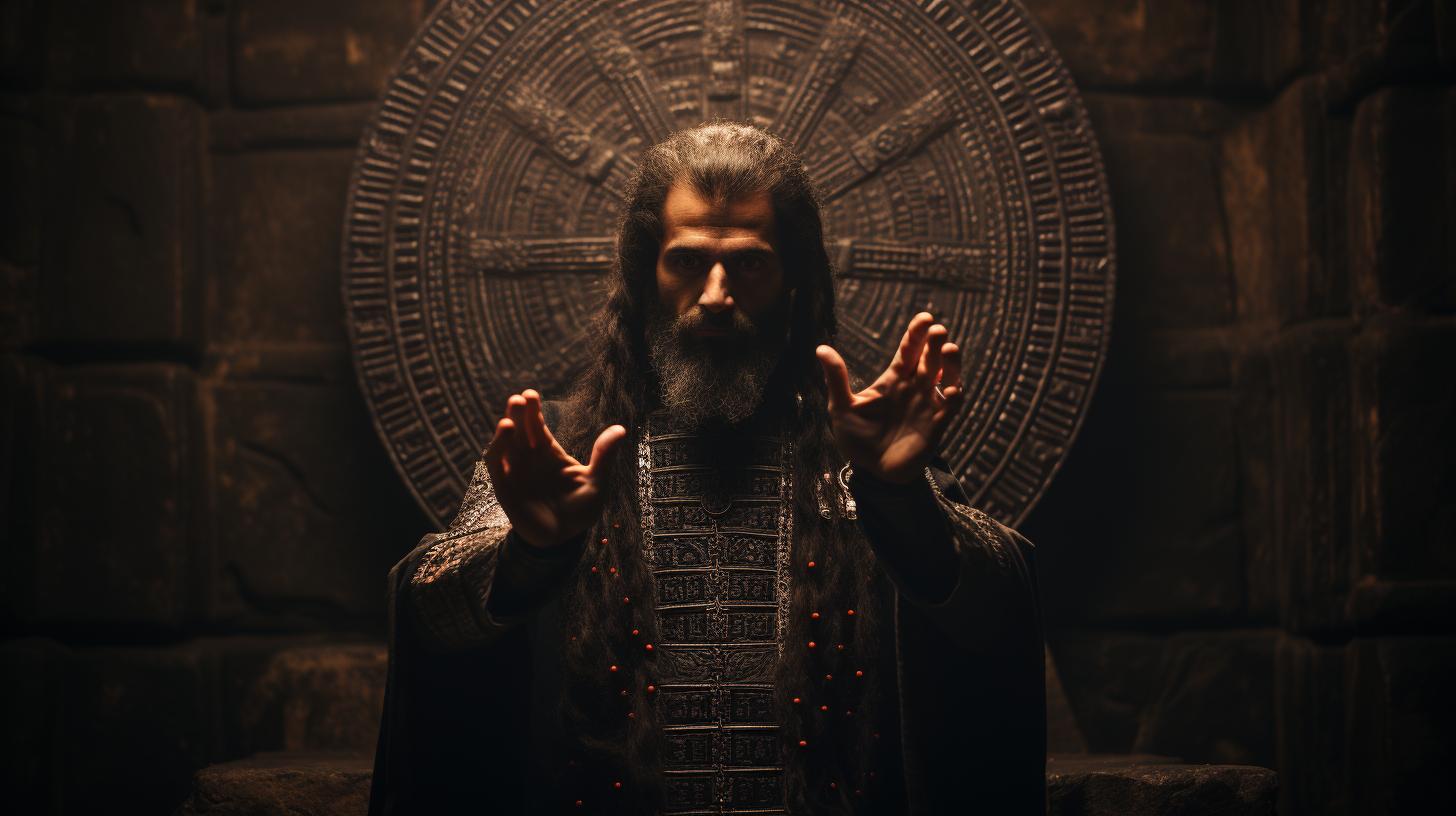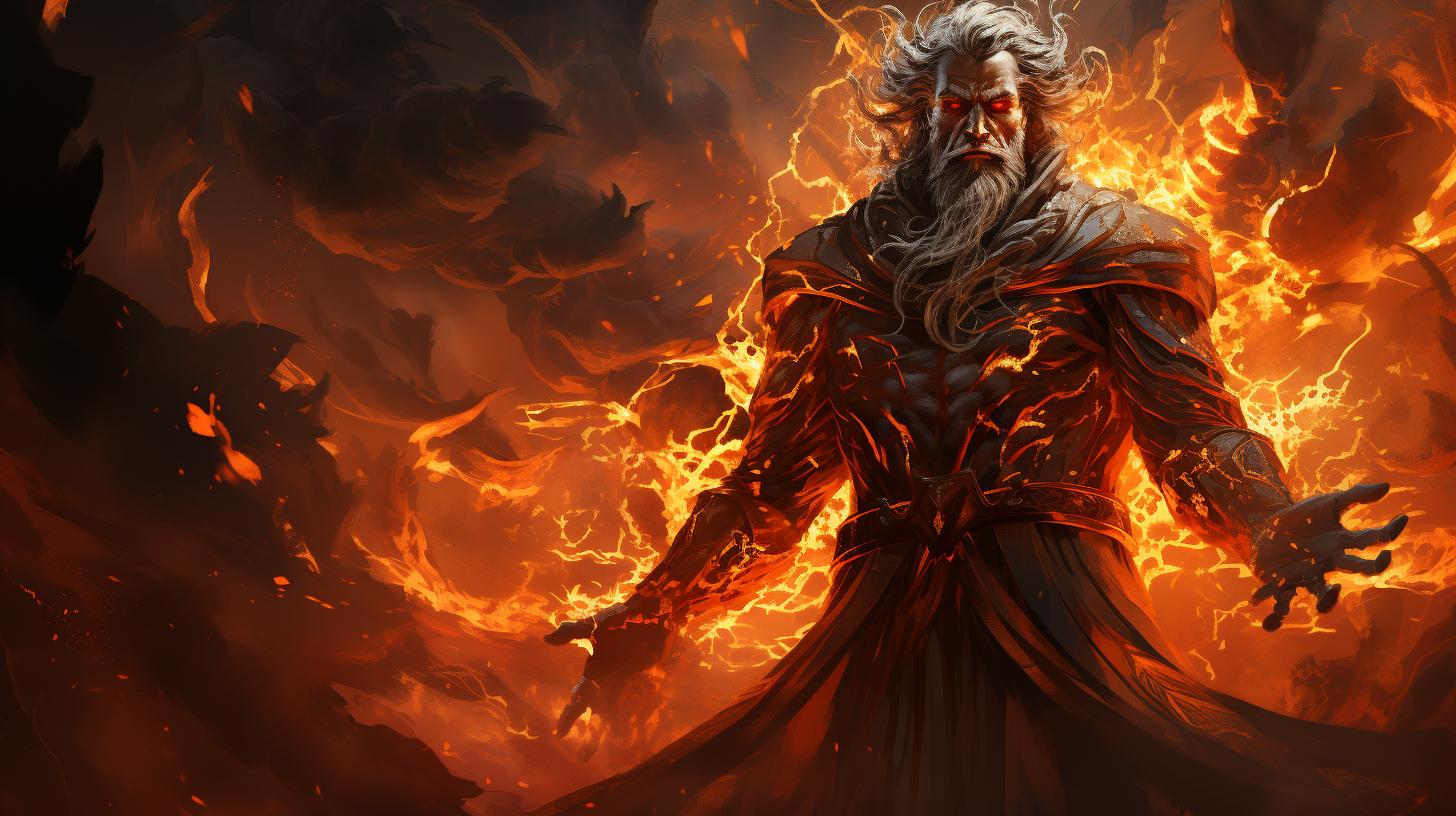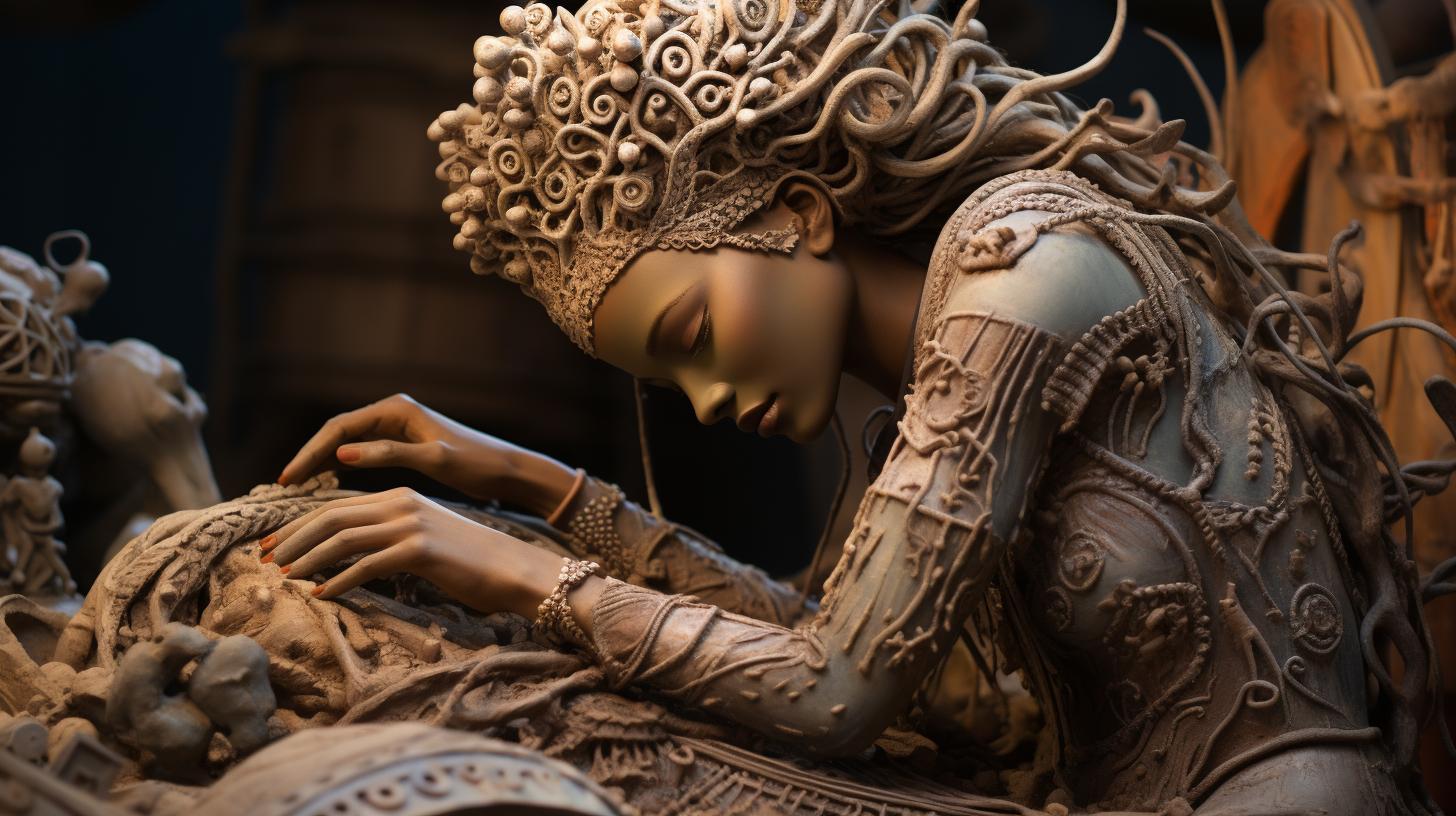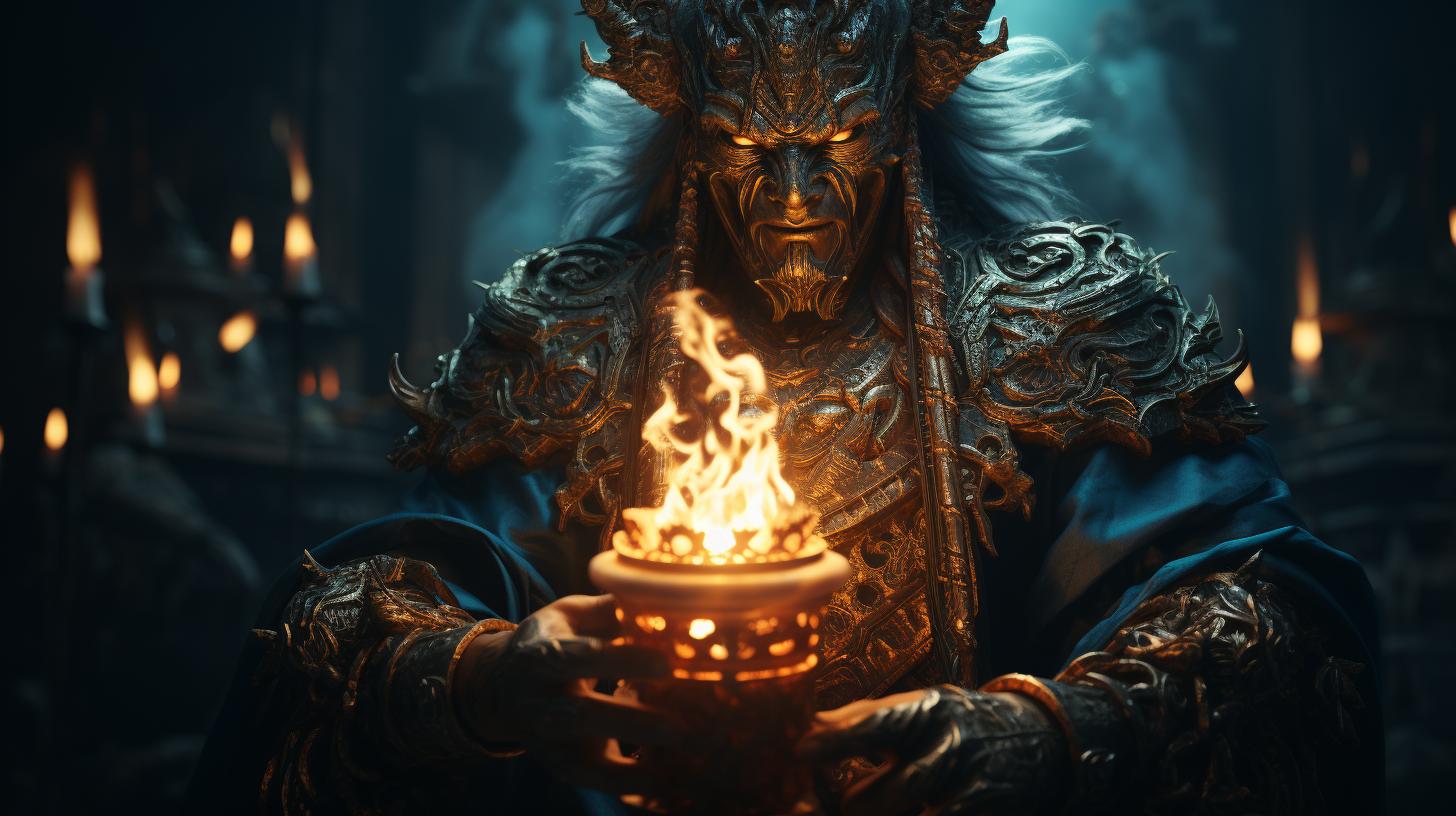Ashur: The Mighty Assyrian God in Ancient Mesopotamia
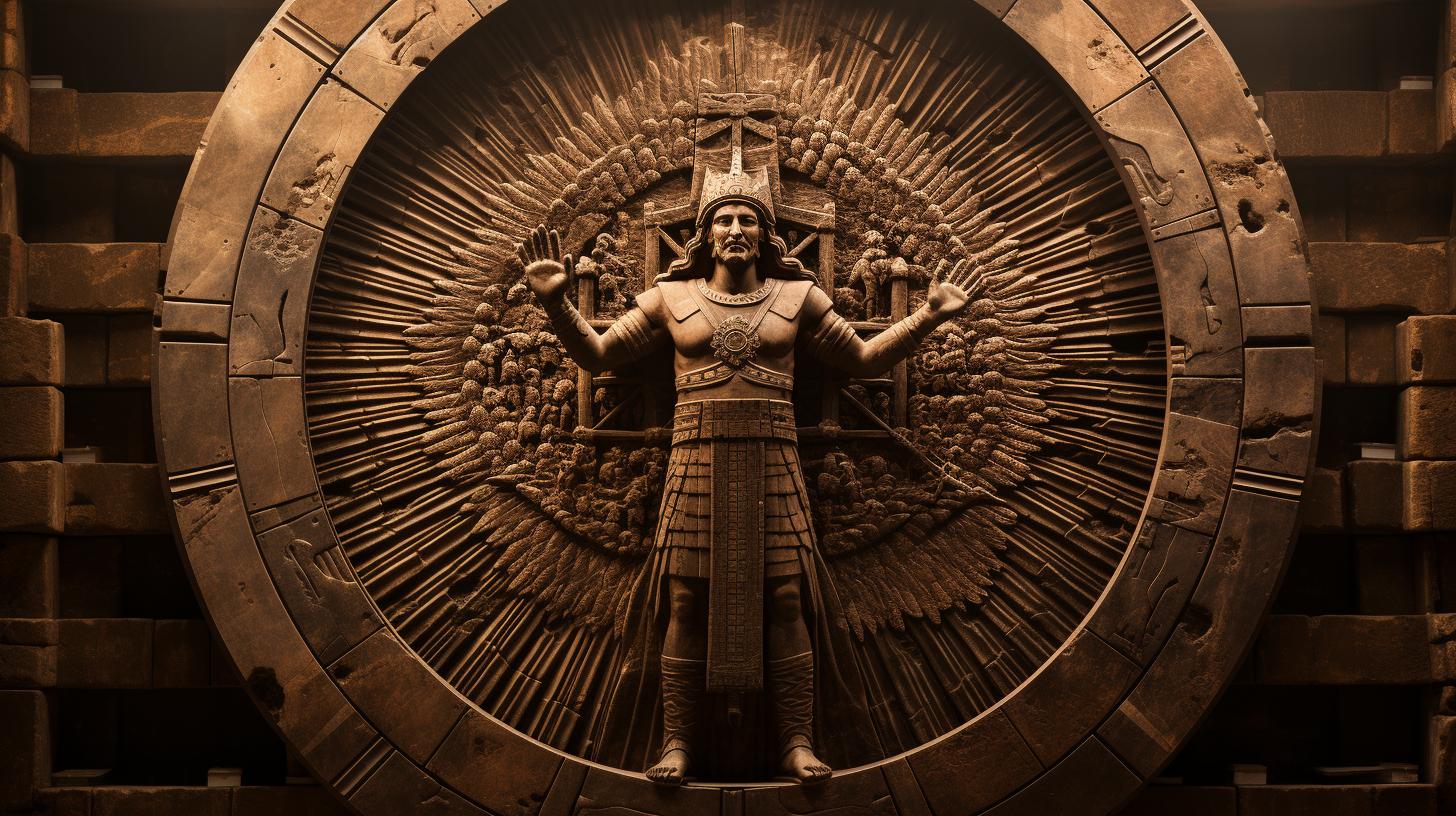
Ashur was the national god of Assyria, revered for his association with warfare and military support. He was initially worshipped as a local deity in the city of Assur, but later became linked to Sumerian deities like Enlil and Anshar.
Despite lacking distinct mythology, Ashur held significant importance in Assyrian culture, as kings identified themselves as vice-regents of the god and maintained his temple. Assur was also home to temples dedicated to other deities such as Anu, Adad, Sin, Šamaš, Ištar, and Nabu. Ashur’s legacy continues to be a symbol in modern Assyrian culture.
The Role of Ashur in Assyrian Warfare and Military Support
Ashur held a significant role in Assyrian society, particularly in the context of warfare and military support. As the national god of Assyria, he was believed to bestow dominion and military prowess onto the Assyrian people.
The reverence for Ashur as a deity of war was deeply ingrained in the Assyrian culture, reflecting their militaristic nature and expansionist ambitions.
Assyrian kings proudly referred to themselves as “vice-regents of the god Ashur,” highlighting their divine connection and authority bestowed upon them.
They exhibited their devotion to Ashur through various means, including royal inscriptions that expressed their allegiance and devotion to the god.
The temple of Ashur, situated in the city of Assur, served as a focal point for worship and supplication.
It was meticulously maintained by the Assyrian rulers, who recognized the importance of honoring Ashur and ensuring his favor in military endeavors. This dedication to the temple further reinforced the link between Ashur and the military might of Assyria.
Ashur’s role in warfare went beyond mere symbolism. It was believed that he actively intervened in battle, providing assistance and guidance to the Assyrian warriors. The Assyrian army, regarded as one of the most formidable military forces of its time, attributed its successes to the divine support and favor granted by Ashur.
The representation of Ashur as a god of war and military support led to the assimilation of aspects from other deities, particularly Enlil and Anshar. This amalgamation aimed to consolidate Ashur’s position and enhance his standing as a powerful patron of Assyrian military endeavors.
In conclusion, Ashur played a pivotal role in fostering the Assyrian military culture and supporting their military campaigns. As the national god of Assyria, his association with warfare and military success was deeply intertwined with the identity and aspirations of the Assyrian people.
The Worship and Devotion of Ashur in Assyria
Ashur, the national god of Assyria, held a central position in the religious and cultural practices of the ancient Assyrians. This section explores the worship and devotion of Ashur, focusing on royal inscriptions and the temple dedicated to the deity in the city of Assur.
Royal Inscriptions and Devotion to Ashur
The Assyrian kings considered themselves “vice-regents of the god Ashur,” emphasizing their close connection and devotion to the deity. These royal inscriptions served as expressions of their loyalty and commitment to Ashur, highlighting their role as protectors of the faith and the Assyrian people.
The inscriptions described the kings’ military conquests, attributes of power, and divine legitimacy conferred by Ashur. Through these inscriptions, the kings sought to demonstrate their unwavering dedication to the god, hoping to gain his favor and the support of the divine forces in their rule and conquests.
By publicly proclaiming their veneration for Ashur, the Assyrian rulers aimed to consolidate their authority and reinforce the religious cohesion of their empire. The inscriptions served as a reminder to their subjects of the kings’ divine mandate and the pervasive presence of Ashur in their lives.
The Temple of Ashur in the City of Assur
The city of Assur housed the magnificent temple dedicated to Ashur, which stood as a physical manifestation of the Assyrians’ devotion to their national god. The temple, meticulously maintained by the Assyrian kings, served as the epicenter of religious activities and rituals associated with Ashur.
Constructed with grandeur and architectural splendor, the temple of Ashur was an imposing edifice that represented the power and divine authority of the god. It was a place of worship, where elaborate ceremonies, sacrifices, and rituals took place to honor and seek the blessings of Ashur.
Within the temple, priests and priestesses conducted daily rituals to invoke Ashur’s favor and protection upon the Assyrian people. These rituals included prayers, offerings, and the performance of sacred rites, all aimed at ensuring the prosperity, military victories, and the well-being of the kingdom.
The temple of Ashur also served as a pilgrimage site, attracting not only the local populace but also visitors from other parts of the empire. Pilgrims sought solace, divine intervention, and blessings from the mighty god, reaffirming their faith in Ashur’s power and influence.
The temple of Ashur stood as a symbol of cultural and religious identity for the Assyrians, reflecting their unwavering devotion to their national deity and their belief in his role as the provider of dominion and military support.
Ashur’s Influence on Assyrian Culture and Politics
Ashur, the national god of Assyria, held significant influence on the culture and politics of the region. As the deity associated with warfare and military support, Ashur played a crucial role in shaping the Assyrian mindset and societal norms.
His influence extended beyond the realm of religion, permeating various aspects of Assyrian life.
First and foremost, the worship of Ashur served as a unifying force for the Assyrian people. The belief in Ashur as the national god created a sense of shared identity and solidarity among the populace.
This not only bolstered the unity of the Assyrian state but also provided a strong foundation for their political aspirations.
Furthermore, the kings of Assyria viewed themselves as the “vice-regents of the god Ashur,” emphasizing the close connection between the divine and the secular rulers.
They sought the favor and guidance of Ashur in their military endeavors, seeking his blessing for conquests and victories. The devotion to Ashur was evident in royal inscriptions and the continuous maintenance of the grand Temple of Ashur in the city of Assur.
By aligning themselves with Ashur, the Assyrian kings solidified their legitimacy and authority. They presented themselves as the chosen representatives of the god, entrusted with the divine mandate to rule over Assyria.
This divine legitimacy not only bolstered their own power but also allowed them to assert dominance over other nations and kingdoms in the region.
Ashur’s influence also extended to other aspects of Assyrian culture.
As the city of Assur housed numerous temples dedicated to other deities, the worship of Ashur acted as a unifying force, bridging the various cults and beliefs within the city. The prominence of Ashur helped establish Assur as a religious and cultural center, attracting pilgrims and seekers of knowledge from other regions.
Moreover, Ashur’s association with Enlil and Anshar further solidified his importance. By drawing connections between the Assyrian god and powerful Mesopotamian deities, Ashur’s divinity was elevated and revered. The royal scribes and scholars of Assyria actively worked to establish these divine familial ties, further enhancing the status of Ashur in the pantheon of gods.
Overall, Ashur’s influence on Assyrian culture and politics cannot be understated. The veneration of Ashur as the national god played a vital role in shaping the collective identity of the Assyrian people.
His influence extended beyond religious practices, permeating the political system, and contributing to the grandeur and authority of the Assyrian empire.
Legacy and Symbolism of Ashur in Modern Assyrian Culture
Ashur, the mighty god of ancient Assyria, continues to hold immense significance in modern Assyrian culture. Despite the decline of the Assyrian empire, the legacy of Ashur is deeply rooted in the Assyrian identity and serves as a powerful symbol of their heritage.
The representation of Ashur as the national god of Assyria resonates strongly among Assyrians today. His association with warfare and military support symbolizes the resilience and strength of the Assyrian people.
Ashur’s name has been carried forward through generations, serving as a reminder of their ancestors’ valor and their historical roots.
Assyrians have preserved the memory of Ashur through various cultural practices and traditions.
In festivals and gatherings, Ashur is honored through music, dance, and storytelling that depict ancient Assyrian legends and the deeds of their gods, including Ashur himself. This keeps the spirit of Ashur alive, connecting present-day Assyrians with their ancestral past.
The architectural remains of the Temple of Ashur in the city of Assur also contribute to the symbolism of Ashur in modern Assyrian culture. While the physical structures may have been eroded by time, the remnants serve as a tangible link to the ancient world, evoking a sense of reverence and pride among Assyrians.
Ashur’s significance goes beyond religious and cultural realms and plays a role in the preservation of the Assyrian language. Assyrians often use ancient Assyrian names, including those derived from Ashur, to name their children.
This practice not only keeps the memory of Ashur alive but also serves as a means of linguistic preservation and cultural continuity.
The symbolism of Ashur extends beyond Assyrian communities, as it has become a rallying point for cultural and political movements seeking to preserve Assyrian identity.
The enduring presence of Ashur serves as a unifying force, bringing together Assyrians from different regions and backgrounds under a shared cultural heritage.
In conclusion, the legacy and symbolism of Ashur in modern Assyrian culture are deeply ingrained.
From festivals and traditions to language and political movements, Ashur continues to inspire and unite Assyrians, serving as a testament to their rich history and identity.
.

